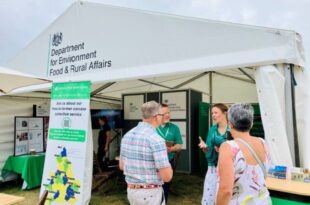I grew up in rural Devon in the village of East Worlington and have worked on my family’s poultry and sheep farm for years. Although I now live in the north-east, I still make it home to help with lambing each year.
Working in Defra means I can see the drive my colleagues have to create the best future for the agricultural sector, and we have a vast array of skills and experience to make that happen.
However, we need to keep learning, to understand what it is like to run a farm on a day-to-day basis. To make sure our policies work, we must look at the world from the farmer's point of view.
I also know from experience that farmers have a huge desire to improve the environment whilst maintaining a profitable business. Farmers want to work with government and have their say on the policies that affect them.
Farm visits are an opportunity for farmers to show us round their farms, to tell us about the issues they are facing, and to make clear the realities of farming. Few things are more compelling and impactful than hearing someone speak about their own experiences. Along with our co-design and engagement work, this is another way for farmers to do that.
It is in linking these things that I feel I can contribute the most. I help to arrange Defra’s farm visits for the programme.
Before COVID-19 came along, farm visits enabled Defra staff to meet farmers and land mangers on site and have open conversations.
Defra has been running farm visits for around 3 years. They have proven to be highly successful.
Visits take place across England from farms in Cornwall to Cumbria and everywhere in between; covering various sectors including dairy, pig, poultry, arable and mixed.
Due to the restrictions with COVID-19, farm visits stopped in early 2020. But the experience was too valuable to abandon, so we adapted and created virtual farm visits instead. And they have been great.
Virtual farm visits can be accessed by a much larger number of people, the largest being over 150 on a single visit (typically just 6-8 staff would have gone on a site visit). It is also much more accessible for staff who may have restrictions preventing them from attending in person.
The virtual visits follow a similar agenda. The farmer gives an introduction and then shows a pre-recorded video that they have filmed. I always emphasise to the farmer that they show us what they feel is important, what they wish to showcase and to focus on areas of most concern. This can range from issues surrounding black grass, implications of banning certain pesticides and many other daily challenges.
We then follow up with a Q&A session. The range of questions is always extremely broad and shows the various interests and backgrounds that Defra staff have. This isn’t just a nice conversation - the farmer’s insightful answers feed directly into our policy thinking.
It also fits more conveniently into the farmer’s day. They don’t have to make time to manage visitors and they can film clips on their phones when it suits them.
The enthusiasm that farmers have shown for these virtual visits has been amazing. I have been surprised by the quality of the videos shot on a mobile phone. You can see for yourself in the video.
The willingness of farmers to open their doors to Defra has allowed some incredibly rewarding visits to happen, and for us to capture some great insight to inform our thinking. Everyone is keen for physical farm visits to return once restrictions allow but, for now, we’re glad to have an effective and safe work-around.
If you have any questions or if you’d like to host a farm visit, please feel free to email my team: ffcpengagement@defra.gov.uk
Finally, thank you to the farmers who appear in the video, which gives a sense of what the virtual farm visits are like.
- John Pawsey, Shimpling Park Farm, Suffolk
- Mark Jelley, Perkins Lodge Farm, Northamptonshire
- George Young, Curtis Farm, Essex
- Greg Colebrook, Greens of Soham, Cambridgeshire


5 comments
Comment by Clifford Jones posted on
I found this an excellent introduction. The farmers and the production standards suggest genuine commitment to engaging with an audience that quite frankly needs something more authoritative than Countryfile.
As an Arch who is keen to be involved with this engagement I was particularly interested in the comments regarding setting land aside for nature. In my case, setting aside for Archaeology and depth of ploughing. But also if farmers have an understanding of what’s beneath the ground it can be a positive influence on planting and usage regimes. I look forward tomorrow of these conversations.
Comment by Peter Green posted on
Great introductory video with passionate farmers who want to help the industry move forward. Thanks for sharing.
Comment by Craig Thompson posted on
Sounds a great initiative.
Is there a programme of planned virtual visits?
How are they publicised?
Are past visits recorded and available to be accessed?
Comment by Graham Higgins posted on
Hi Craig, the virtual visits are made for internal use so the Future Farming team can meet and talk to as many farmers and land managers as possible to better understand how they work and the issues they face. They do happen roughly every few months depending on the availability of contributors. We will continue to share more videos as much as we can. The best way to find out more is to keep an eye on the blog. Thanks for your comment and questions. Graham
Comment by Emma Bailey-Beech posted on
I loved the snippet of video's combined - clearly I missed a few when they were first published, so will go back and review them. It's lovely to get that exposure to farms all over the place - thanks to those farmers that take part!